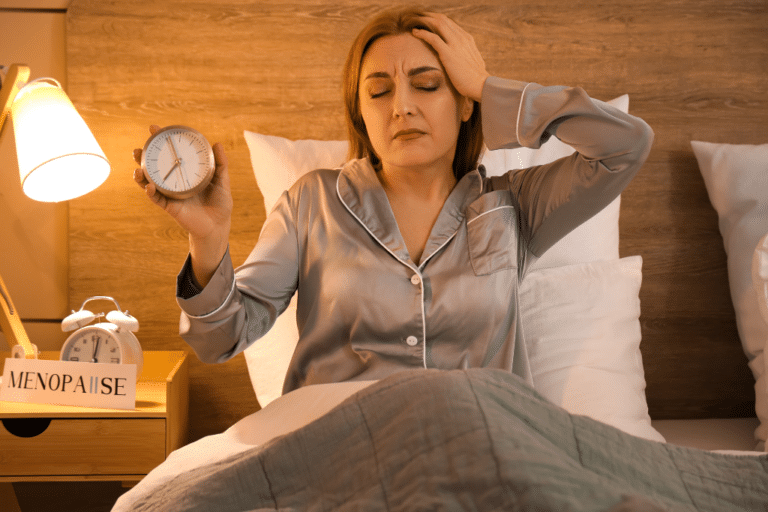You’ve probably heard that your body has an “internal clock.” But what does that really mean, especially for women navigating midlife and beyond?
Spoiler alert: it’s not just about sleep. Your circadian rhythm (that internal 24-hour cycle) is the master regulator of almost every system in your body. When it’s working well, you feel energized, mentally sharp, and hormonally balanced. When is it not? Things get messy!
Let’s break it down.
What Is Circadian Rhythm?
Circadian rhythm is your body’s internal timekeeper. It tells your brain and body when it’s time to wake up, eat, think clearly, detox, repair, and rest. It follows the natural patterns of light and darkness over a 24-hour period—and ideally, so should we.
But in our modern world? We’ve got artificial lighting, Netflix binges at midnight, irregular meal timing, and caffeine on tap. All of this confuses your internal clock, and the downstream effects can be surprisingly widespread.
Body Systems That Run on Your Clock (And How It Shows Up in Real Life)
Every cell in your body has a circadian clock. Here’s what that looks like when it’s working… and when it’s not:
Sleep-Wake Cycle
✅ In rhythm: You fall asleep easily, stay asleep, and wake refreshed.
❌ Out of rhythm: You’re wide awake at 3am or exhausted by mid-afternoon.
Metabolism
✅ In rhythm: You burn energy efficiently and maintain stable blood sugar.
❌ Out of rhythm: You gain weight (especially belly fat), crave sugar at night, and feel sluggish.
Brain Function
✅ In rhythm: You feel focused and emotionally balanced.
❌ Out of rhythm: Brain fog, forgetfulness, and mood swings take over.
Hormones
✅ In rhythm: Cortisol, estrogen, thyroid, and melatonin follow their natural daily rhythms.
❌ Out of rhythm: You feel anxious, wired-but-tired, or experience hormone chaos.
Gut Health
✅ In rhythm: Smooth digestion and regular bowel movements.
❌ Out of rhythm: Constipation, bloating, or gut discomfort.
Immune Function
✅ In rhythm: Your immune system repairs at night and protects during the day.
❌ Out of rhythm: You get sick easily, feel inflamed, or recover slowly.
Why This Especially Matters in Perimenopause and Beyond
As estrogen and progesterone decline, your circadian system becomes more sensitive. Melatonin also drops, making it harder to fall and stay asleep. Add in age-related inflammation and slower cellular repair, and suddenly that “minor sleep issue” becomes a major health disruptor.
When your circadian rhythm is out of sync after 50, you’re more likely to experience:
- Fatigue and brain fog
- Blood sugar issues and weight gain
- Mood instability
- Hormone fluctuations that feel like you’re back in perimenopause
- Poor immune function and inflammation
This isn’t about vanity or just “getting better sleep.” It’s about protecting your healthspan—your ability to feel strong, focused, and vibrant for the decades ahead.
Signs Your Rhythm Might Be Off
- Trouble falling or staying asleep
- Waking between 1–4 am
- Daytime fatigue despite “enough” sleep
- Nighttime cravings
- Mood swings or anxiety
- Sluggish digestion
- Hot flashes that worsen at night
5 Ways to Get Back in Rhythm
1. Get Natural Light in the Morning
Just 10–15 minutes can anchor your internal clock. Bonus if you can do it without sunglasses.
2. Keep a Consistent Sleep-Wake Time
Yes, even on weekends. Your body loves predictability.
3. Stop Eating Late
Front-load your calories earlier in the day and try to stop eating 2–3 hours before bed.
4. Cut the Blue Light at Night
Dim the lights, shut off screens, or wear blue light blockers to support natural melatonin production.
5. Wind Down With Intention
Your nervous system needs a signal that it’s safe to rest. Try journaling, stretching, or a warm bath.
Final Thought
Your circadian rhythm is one of the most overlooked levers of health, especially for women over 50. When it’s in sync, your hormones, brain, gut, and immune system all function better.
When it’s off, you’re fighting biology every day.
Start with one small change this week. Your future self will thank you for it.
Dr. Anna Garrett is a menopause expert and Doctor of Pharmacy. She helps women who are struggling with symptoms of perimenopause and menopause find natural hormone balancing solutions so they can rock their mojo through midlife and beyond. Dr. Anna is the author of Perimenopause: The Savvy Sister’s Guide to Hormone Harmony. Order your copy at www.perimenopausebook.com.
Dr. Anna is available for 1-1 consultation. Find out more at www.drannagarrett.com/lets-talk




